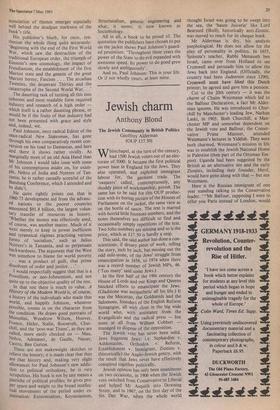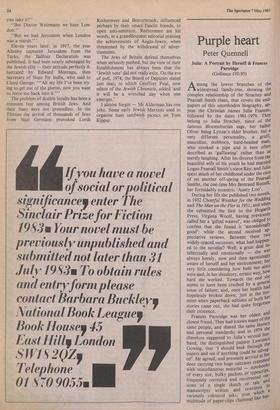Jewish charm
Anthony Blond
The Jewish Community in British Politics Geoffrey Alderman (OUP £17.50) whitechapel, at the turn of the century, had 1500 Jewish voters out of an elec- torate of 5000. It became the first political power base in England for the Jews. They also operated, and exploited immigrant labour for, the garment trade. The `sweaters' called, contemptuously, any shoddy piece of workmanship, goyish. The same has to be said for this OUP produc- tion with its boring picture of the Houses of Parliament on the jacket, the same view as on the bottle of sauce. The text is marred with horrid little footnote numbers, and the notes themselves are difficult to find and occasionally simply repetitions of the text. Two folio numbers are missing and so is the price, which at £17.50 is hardly a snip.
This said, the said author has done a con- scientious, if dreary piece of work, telling the story, inch by inch, but missing out the odd mile-stone, of the Jews' struggle from emancipation in 1858, to 1974 when there was a record number of Jewish MPs, 46. (`Too many' said some Jews.) In the first half of the 19th century the House of Lords and our Kings and Queens blocked efforts to emancipate the Jews. (Gladstone was antipathetic all his life.) It was the Mocattas, the Goldsmids and the Salomons, founders of the English Reform Synagogue, all with clout in the big wide world who, with assistance from the Evangelicals and the radical press — but none at all from William Cobbett
managed to dispose of the opposition.
The Jewish vote has never been solid. Jews fragment Jews: i.e. Sephardim v. Ashkenazim, Orthodox v. Reform, Establishment v. Immigrant, Zionists v. (historically) the Anglo-Jewish gentry, with the result that Jews never have effectively conspired together politically.
Jewish opinion has only been unanimous on two occasions, in 1906 when the Jewish vote switched from Conservative to Liberal and helped Mr Asquith into Downing Street, and in 1967, on the first day of the Six Day War, when the whole world thought Israel was going to be swept into the sea, the 'haute Juiverie' like Lord Bearsted (Shell), historically anti-Zionist, was moved to reach for its cheque book.
Mr Alderman is dry, his analysis psephological. He does not allow for the play of personality in politics. In 1655, Spinoza's teacher, Rabbi Menasseh ben Israel, came over from Holland to see Cromwell and persuade him to allow the Jews back into England. (Officially, the country had been Judenrein since 1290). Cromwell must have liked this Dutch printer; he agreed and gave him a pension.
Cut to the 20th century — it was the charm of Chaim Weizmann which led to the Balfour Declaration, a fact Mr Alder- man ignores. He was introduced to Chur- chill by Manchester's leading Jew, Nathan Laski, in 1905. 13oth Churchill, a Man- chester MP and somewhat dependent on the Jewish vote and Balfour, the Conser-
vative Prime Minister, attended Weizmann's lectures in Yiddish. They were both charmed. Weizmann's mission in life was to establish the Jewish National Home in Palestine (then part of the Ottoman Em- pire). Uganda had been suggested by the British as an alternative site and the early Zionists, including their founder, Herzl, would have gone along with that — but not Weizmann.
Here is the Russian immigrant of one year standing talking to the Conservative leader. 'Mr Balfour, supposing I were to offer you Paris instead of London, would you take it?"
"But Doctor Weizmann we have Lon- don."
"But we had Jerusalem when London was a marsh."' Eleven years later, in 1917, the year Allenby captured Jerusalem from the Turks, the Balfour Declaration was published. It had been nearly sabotaged by the Jewish elite — their attitude perfectly il- lustrated by Edward Montagu, then Secretary of State for India, who said to Lloyd George: ' "All my life I've been try- ing to get out of the ghetto, now you want to force me back into it."' The problem of double loyalty has been a constant fear among British Jews. And their fears were not groundless. In the Thirties the arrival of thousands of Jews from Nazi Germany provoked Lords Rothermere and Beaverbrook, influenced perhaps by their smart Fascist friends, to open anti-semitism. Rothermere ate his words, in a grandiloquent editorial praising the achievements of Anglo-Jewry, when threatened by the withdrawal of adver- tisements.
The Jews of Britain defend themselves when seriously pushed, but the view of their Establishment has always been that the `Jewish vote' did not really exist. On the eve of poll, 1974, the Board of Deputies stated just that; to which Geoffrey Paul, now editor of the Jewish Chronicle, added 'and it will be a wretched day when one emerges.'
I almost forgot — Mr Alderman has one joke. Some early Jewish Marxists used to organise ham sandwich picnics on Yom Kippur.











































 Previous page
Previous page